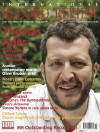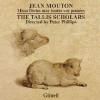Texte paru dans: / Appeared in:
*

International Record Review - (11/2012)
Pour
s'abonner / Subscription information
Gimell
CDGIM047

0755138104723
(ID262)
Consultez toutes les évaluations recensées pour ce cd
~~~~ Reach all the evaluations located for this CD
Although Jean Mouton (c.1459-1522) was a most renowned and hugely influential composer and teacher of his time, he is not well represented on disc. His canonic, double four-voiced choir motet, Nesciens mater, is (deservedly) his most recorded work. Yet, on the discs where it has appeared, it is often the only piece by Mouton. While The Tallis Scholars’ disc is not the first all-Mouton disc, it has few predecessors. It follows hard on the heels of The Brabant Ensemble’s Mouton disc issued by Hyperion last May (reviewed in the June issue by Andrew O’Connor). The Washington DC-based, all-male a cappella choir, The Suspicious Cheese Lords (yes, that really is their name), recorded his Missa ‘Alma Redemptoris Mater’ and several motets on their own label in 2007. The Ensemble Jacques Moderne under Joel Suhubiette recorded for Ligia Digital in 2002 a disc of music Mouton wrote for and in memory of Anne of Brittany (Sovereign Duchess of Brittany, briefly bride of Maximilian I and twice Queen Consort of France) , who was his employer before he joined the French royal chapel. Finally, in 2002 The Gentlemen of St John’s issued a Mouton disc on the Quilisma label, which was the premiere on disc of the Missa ‘Dictes moy toutes voz pensées’ that The Tallis Scholars have now recorded.
Peter Phillips’s programme notes are, as always, packed with technical details of the works, explained with exemplary clarity. His easy-to-follow description of the ‘access code’ for Nesciens mater, a Nativity motet of extraordinary technical skill and immense beauty, certainly enhances one’s enjoyment of the work. Also strikingly clear is the recording, made in the choir’s usual venue, the Chapel of Merton College.
Long ago, I was put off The Tallis Scholars by Phillips’s strange comments about the music they sing, denying any value to its evident devotional (and therefore emotional) qualities and intent and propounding it instead simply as pure music. They certainly are an impressively skilful choir, notable especially for their smoothness of tone, perfect intonation and flawless ensemble; but with these qualities I have always found come a glassy coldness and a clinical detachment from music that, though lacking the overt drama of the Baroque, in fact seeks to plumb the deepest recesses of the human soul.
This disc, however, presents a new Tallis Scholars sound: still highly burnished, exquisitely refined and crystalline, it also seems somehow warmer and more human (or perhaps humane) than before. Maybe the reason is the mature Mouton’s famously forward-looking voluptuous harmonies and clarity of textual and emotional expression. Perhaps it is the low tessituras he favoured in much of the music on this disc. Only Nesciens mater, Salva nos, Domine and hugely lengthy five-voice Ave Maria . . . virgo serena have trebles on the top line (female sopranos, singing with customary brilliance). The majestically mournful Quis dabit oculis? and quietly happy Ave Maria . . . benedicta tu are sung by altos, two sets of tenors and basses. The four voices of the technically virtuosic but nevertheless elegantly relaxed Missa ‘Dictes moy toutes voz pensées’ also omit a soprano and are distributed among alto, tenor, baritone and bass. In its second ‘Agnus Dei’, moreover, the three upper voices drop out completely in favour of solemn trio of basses, before the whole ensemble returns with an additional tenor voice in the final, five-voiced ‘Agnus Dei’. In each case, only two voices per part are employed, but this does not affect the monumentality of Mouton’s style.
Even so, everything is not perfect. The singing still is a little cool in comparison with, say, The Brabant Ensemble’s. Despite the presence of Caroline Trevor as one of their two altos, The Tallis Scholars are still very countertenor-dominated, recalling the Anglican cathedral sound that, albeit sublime on its own terms, never quite gels for me with Catholic polyphony of the Renaissance. Also, tempos tend to be marginally on the slow side, perhaps reflecting Phillips’s perception of ‘a spirit of calm and poise’ as the principal feature of Mouton’s music alongside the technical virtuosity, whereas one cannot help wondering, especially in the complex, double-choir Nesciens mater, or even in the serene Ave Maria . . . virgo serena, whether slightly brisker pacing might better complement the drama hidden in Mouton’s writing.
These are only relatively minor drawbacks and indeed I
expect to be drawn back to this disc by the superb music.
Fermer la fenêtre/Close window
Cliquez l'un ou l'autre
bouton pour découvrir bien d'autres critiques de CD
Click either button for many other reviews


